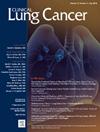Association of Oncogene Driver Mutations with Recurrence and Survival in Stage I Nonsmall Cell Lung Cancer
IF 3.3
3区 医学
Q2 ONCOLOGY
引用次数: 0
Abstract
Background
Stage I nonsmall cell lung cancer (NSCLC) is primarily treated with surgical resection and has a favorable prognosis with an expected recurrence rate of 30%. New methods to risk stratify patients with stage I NSCLC are needed to help select those that might benefit from more active surveillance or adjuvant therapy.
Methods
We analyzed clinical data from 1330 patients (1469 tumors) with NSCLC and correlated it with next-generation sequencing (NGS). To reduce the potential confounding variables of stage and treatment, this analysis only included patients with stage I NSCLC in whom surgical resection was the primary treatment.
Results
In 570 patients (600 tumors), 75 (12.5%) developed recurrence. Recurrence occurred in 37.5% of patients with KRAS G12V mutation versus 11.1% of patients without this mutation (P < .001). A lower chance of recurrence was associated with “any EGFR” mutation (6.74% vs. 14.9%, P = .006). A history of coronary artery disease (CAD) increased the chance of recurrence: OR 2.7 (1.57-4.89, P < .001). Shorter survival was predicted by KRAS G12V (P = .009) and “other TP53” mutation (P = .025). KRAS G12V, KRAS G13D, MET E168D, PTEN, and “other TP53” were oncogene mutations associated with reduced survival in stage I NSCLC. CAD, type 2 diabetes (DM2), and “other cancer” were medical comorbidities associated with reduced survival in stage I NSCLC.
Conclusions
Oncogene mutations such as KRAS G12V and EGFR may have implications for cancer surveillance strategies and inform future treatment trials of stage I NSCLC.
肿瘤基因驱动突变与 I 期非小细胞肺癌复发和生存的关系
背景:I期非小细胞肺癌(NSCLC)主要采用手术切除治疗,预后良好,预计复发率为30%。需要新的方法对I期NSCLC患者进行风险分层,以帮助选择那些可能从更积极的监测或辅助治疗中受益的患者。方法:我们分析了1330例NSCLC患者(1469例肿瘤)的临床资料,并将其与下一代测序(NGS)相关联。为了减少分期和治疗的潜在混淆变量,本分析仅包括以手术切除为主要治疗方法的I期NSCLC患者。结果:570例患者(600个肿瘤)中75例(12.5%)复发。KRAS G12V突变患者的复发率为37.5%,而没有这种突变的患者的复发率为11.1% (P < 0.001)。与“任何EGFR”突变相关的复发率较低(6.74%对14.9%,P = 0.006)。冠状动脉疾病(CAD)病史增加复发机会:OR 2.7 (1.57 ~ 4.89, P < 0.001)。KRAS G12V (P = 0.009)和“其他TP53”突变(P = 0.025)预测的生存期较短。KRAS G12V、KRAS G13D、MET E168D、PTEN和“其他TP53”是与I期NSCLC生存率降低相关的癌基因突变。冠心病、2型糖尿病(DM2)和“其他癌症”是与I期非小细胞肺癌生存率降低相关的医学合并症。结论:癌基因突变如KRAS G12V和EGFR可能对癌症监测策略有影响,并为未来I期NSCLC的治疗试验提供信息。
本文章由计算机程序翻译,如有差异,请以英文原文为准。
求助全文
约1分钟内获得全文
求助全文
来源期刊

Clinical lung cancer
医学-肿瘤学
CiteScore
7.00
自引率
2.80%
发文量
159
审稿时长
24 days
期刊介绍:
Clinical Lung Cancer is a peer-reviewed bimonthly journal that publishes original articles describing various aspects of clinical and translational research of lung cancer. Clinical Lung Cancer is devoted to articles on detection, diagnosis, prevention, and treatment of lung cancer. The main emphasis is on recent scientific developments in all areas related to lung cancer. Specific areas of interest include clinical research and mechanistic approaches; drug sensitivity and resistance; gene and antisense therapy; pathology, markers, and prognostic indicators; chemoprevention strategies; multimodality therapy; and integration of various approaches.
 求助内容:
求助内容: 应助结果提醒方式:
应助结果提醒方式:


